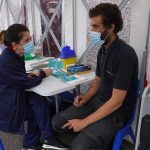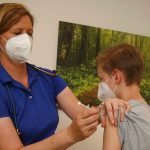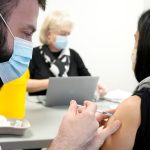The UK will have more than one million Omicron cases by the end of this month if current trends continue unchanged – but booster jabs provide 70-75% protection against symptomatic infection, says the Health Security Agency.
The UKHSA said in a statement: “It is projected that if current trends continue unchanged, the UK will exceed one million infections by the end of this month.”
It said that the AstraZeneca and Pfizer/BioNtech jabs provided “much lower levels of protection against symptomatic infection compared to the protection that they provide against Delta”.
But it added: “The preliminary data showed effectiveness against the new variant appears to increase considerably in the early period after a booster dose, providing around 70-75% protection against symptomatic infection.
“Due to the early nature of the findings, all estimates are subject to significant uncertainty and are subject to change.”
Dr Mary Ramsay, head of immunisation at the UKHSA, said: “These early estimates should be treated with caution but they indicate that a few months after the second jab, there is a greater risk of catching the Omicron variant compared to Delta strain.
“The data suggest this risk is significantly reduced following a booster vaccine, so I urge everyone to take up their booster when eligible.
COVID-19: Omicron cases rise sharply by 448 and all coronavirus infections top 58,000 in latest UK daily figures
COVID live UK news: ‘Plan C’ rumours grow amid Omicron fears – as Tories fall behind Labour in polls after Christmas party scandal
Dominic Cummings says pictures of Downing Street parties exist – and will ‘inevitably get out’
“We expect the vaccines to show higher protection against the serious complications of COVID-19, so if you haven’t yet had your first two doses please book an appointment straight away.
“Working from home where possible, consistently wearing masks in crowded or enclosed spaces, washing your hands regularly and isolating and getting tested if you feel unwell are also vitally important in reducing the impact of COVID-19 this winter.”






















